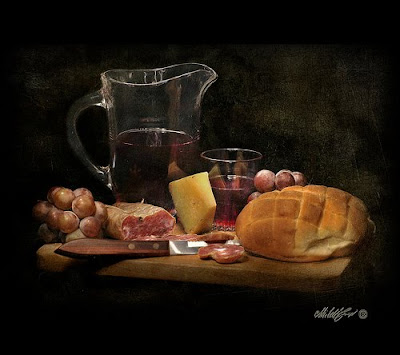 October Journey
October JourneyTraveller take heed for journeys undertaken in the dark of
the year.
Go in the bright blaze of Autumn's equinox.
Carry protection against ravages of a sun-robber, a vandal,
a thief.
Cross no bright expanse of water in the full of the
moon.
Choose no dangerous summer nights;
no heavy tempting hours of spring;
October journeys are safest, brightest, and best.
I want to tell you what hills are like in October
when colors gush down mountainsides
and little streams are freighted with a caravan of leaves,
I want to tell you how they blush and turn in fiery shame
and joy,
how their love burns with flames consuming and terrible
until we wake one morning and woods are like a smoldering
plain--
a glowing caldron full of jewelled fire;
the emerald earth a dragon's eye
the poplars drenched with yellow light
and dogwoods blazing bloody red.
Travelling southward earth changes from gray rock to green
velvet.
Earth changes to red clay
with green grass growing brightly
with saffron skies of evening setting dully
with muddy rivers moving sluggishly.
In the early spring when the peach tree blooms
wearing a veil like a lavender haze
and the pear and plum in their bridal hair
gently snow their petals on earth's grassy bosom below
then the soughing breeze is soothing
and the world seems bathed in tenderness,
but in October
blossoms have long since fallen.
A few red apples hang on leafless boughs;
wind whips bushes briskly
And where a blue stream sings cautiously
a barren land feeds hungrily.
An evil moon bleeds drops of death.
The earth burns brown.
Grass shrivels and dries to a yellowish mass.
Earth wears a dun-colored dress
like an old woman wooing the sun to be her lover,
be her seetheart and her husband bound in one.
Farmers heap hay in stacks and bind corn in shocks
against the biting breath of frost.
The train wheels hum, "I am going home, I am going home,
I am moving toward the South."
Soon cypress swamps and muskrat marshes
and black fields touched with cotton will appear.
I dream again of my childhood land
of a neighbor's yard with a redbud tree
the smell of pine for turpentine
an Easter dress, a Christmas eve
and winding roads from the top of a hill.
A music sings within my flesh
I feel the pulse within my throat
my heart fills up with hungry fear
while hills and flatlands stark and staring
before my dark eyes sad and haunting
appear and disappear.
Then when I touch this land again
the promise of a sun-lit hour dies.
The greeness of an apple seems
to dry and rot before my eyes.
The sullen winter rains
are tears of grief I cannot shed.
The windless days are static lives.
The clock runs down
timeless and still.
The days and nights turn hours to years
and water in a gutter marks the circle of another world
hating, resentful, and afraid,
stagnant, and green, and full of slimy things.
~
Margaret WalkerPhoto by the blogger; if you copy, please link back.











